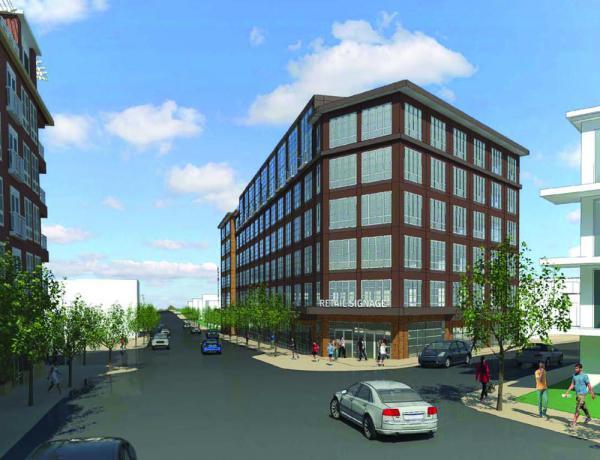July 24, 2014

What Trinity Financial hopes to build on the current site of the Ashmont Tire on Dorchester Ave. Image courtesy Trinity Financial Inc./The Architectural Team
Community members got their first detailed look at what a proposed six-story, mixed-use building coming to the Ashmont Tire site on Dorchester Avenue would look like at a meeting held on Monday evening at Carney Hospital’s Riseman Lecture Hall.
Organized by Trinity Financial, Inc.— the firm that developed and owns the Carruth building across the street— the Ashmont Tire proposal would bring another 4,000 feet of retail space, 81 residential units, and 44 parking spaces in a new building designed to serve as a gateway between Peabody Square and Lower Mills.
Because of the Carruth, “we have double the reason to make sure the Ashmont Tire that we’re proposing is successful,” said Kenan Bigby, a project manager for Trinity Financial who led Tuesday’s meeting. The Carruth building, built on a former MBTA parking lot, has become a model for successful “transit-oriented” development in the city. The mixed-use building, which opened in 2007, features residential apartments on five floors above first-floor retail spaces, including a bank branch, coffee shop, and the popular eatery Tavolo. The building, which opened as the Ashmont T station next door was itself undergoing a total reconstruction, has sparked a resurgence in the Ashmont/Peabody Square neighborhood in recent years.
Trinity recently entered into a deal to purchase the Ashmont Tire property for an undisclosed amount, with the sale contingent on the development firm making a viable project work at the site. Monday’s meeting was the latest in a series of community sessions with smaller civic groups that have been happening since June, but it was the first “community-wide” forum in which plans for the site – tentatively named Ashmont TOD2 – were given in detail.
The vision for the first floor’s retail space is that it will activate business by enticing visitors from Ashmont Station and along Dorchester Avenue, much like the Carruth. Trinity said the ideal retail occupant would be one neighborhood-based business able to utilize all 4,000 square feet, such as a bakery, yoga studio, or dry cleaner. However, a number of community members were skeptical that a lone retailer could occupy that much space, though a shout of “Trader Joe’s!” was well-received by the more than 200 people who turned out for the presentation. Bigby told the crowd that Trinity had found little interest from grocers such as Trader Joe’s during their initial market research.
Parking was a major concern for some of the community members who packed the meeting. The building will have 35 below-ground parking spaces with nine spots behind the building for building residents, giving one parking spot to roughly two units. Both would be accessible by a one-way driveway running behind the building, beginning at Fuller Street and exiting at Mercier Avenue. The Trinity representatives maintained the newly created road would only be used by building residents and not serve as a cut-through or new street for passing traffic. They also conducted a traffic study, very much contested at the meeting, that determined that there is ample parking along both Fuller and Mercier, which would allow for greater parking potential. Both streets are currently available to cars with Dorchester resident stickers.
Trinity is also looking to create six new parking spots in front of the building on Dorchester Avenue to free up more access to the building to retail customers. As to the immediate future, community members were concerned about the loss of parking for popular neighborhood businesses such as Tavolo once the Ashmont Tire parking lot is razed for the new building. As things stand, Ashmont Tire will remain open for the next year as Mike Seigal, the current owner, determines the next step for his three-generations-old business.
The building’s proposed 81 residential units would be housed in the six-story building with windows designed to harken back to the site’s history as a garage, developers said. Forty-four units – ranging from studios to three-bedroom units – would be marketed as affordable, costing between $470 to $1,400 per month. These units would be situated on the first through fourth floors, with the units on the first floor along the back of the building separated from the residential space by a hallway that runs through the middle of the structure.
The top two floors are set to be market-rate condominiums targeting middle-income households, something badly needed in Boston’s current market, Trinity said. Those 37 condo units, comprising studios up to three-bedroom units ,would likely retail for just under $500 per square foot.
Over the next two months, Trinity will work to secure approvals and garner community support before closing on the Ashmont Tire site in October, then use the next year to raise project capital and break ground.
The company’s close ties to the neighborhood give it a special stake in how the project takes shape, explained Bigby, who noted that Trinity founder and president James Keefe, who was at the meeting, lives just a few streets away in Ashmont Hill.
“If somehow we do screw something up here,” Bigby said, “these guys will have no peace when they go to and from work here.”
Villages:
Topics:


